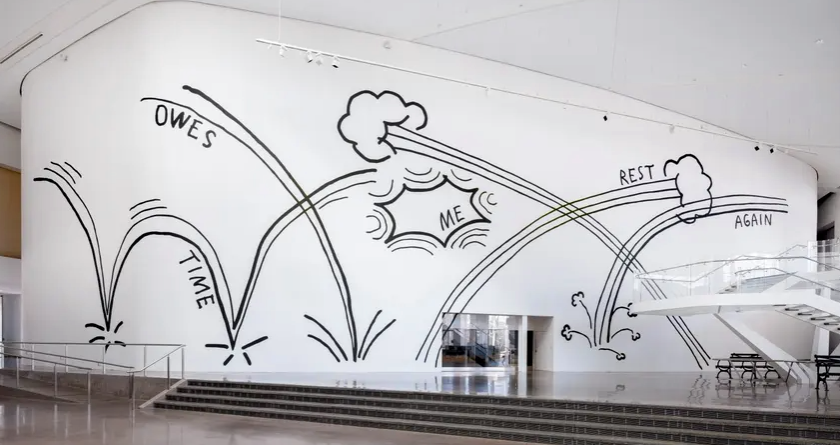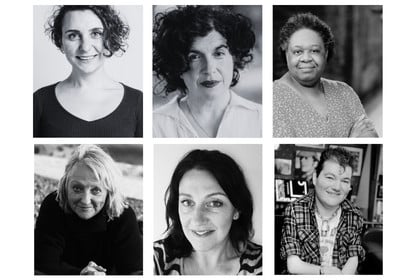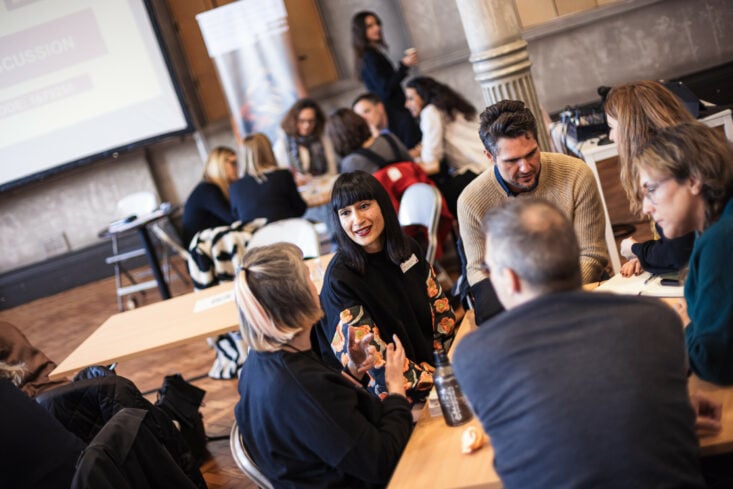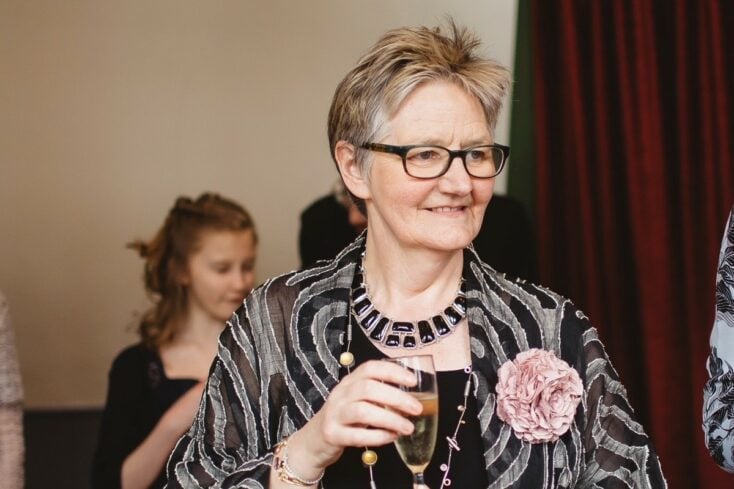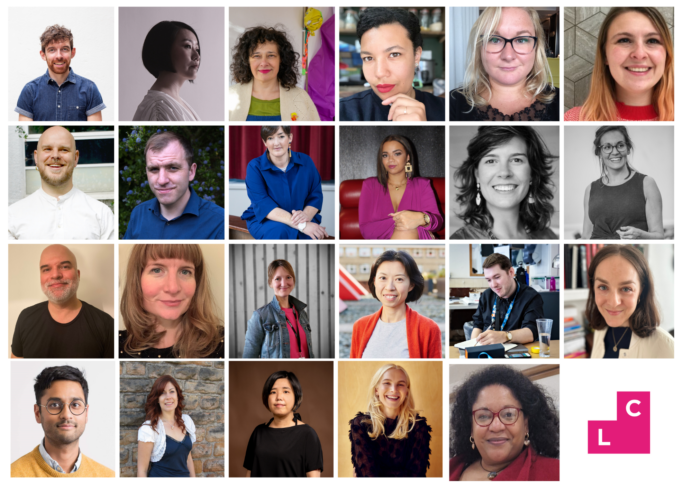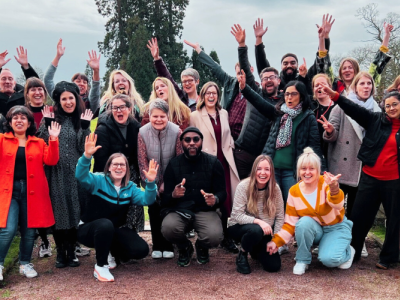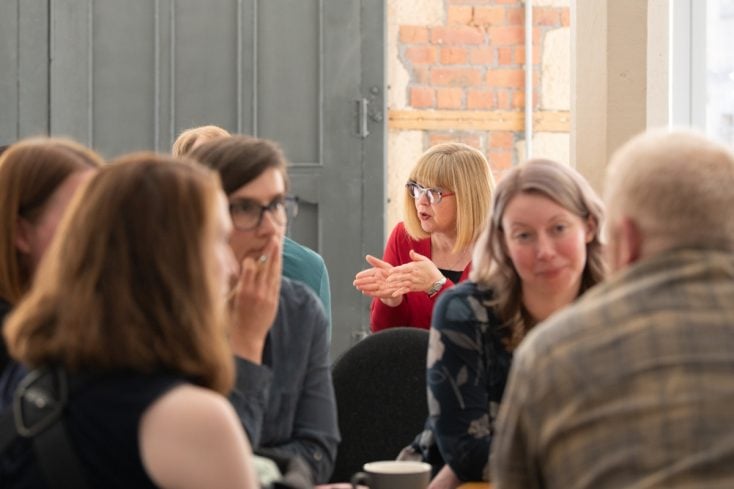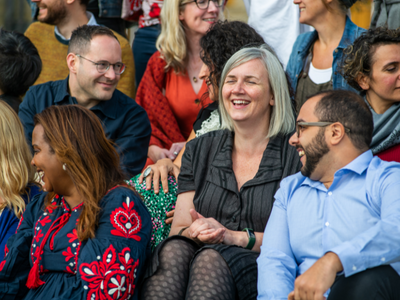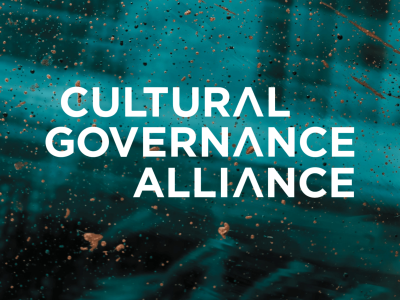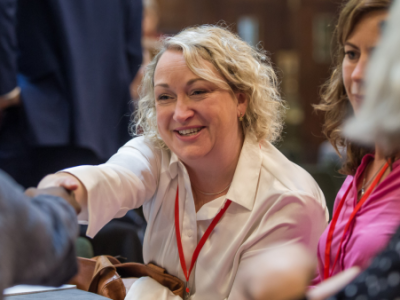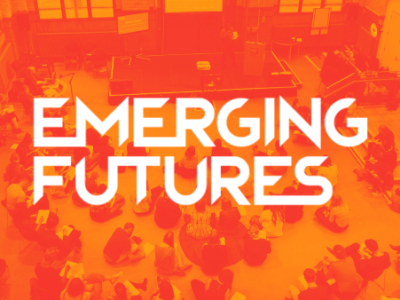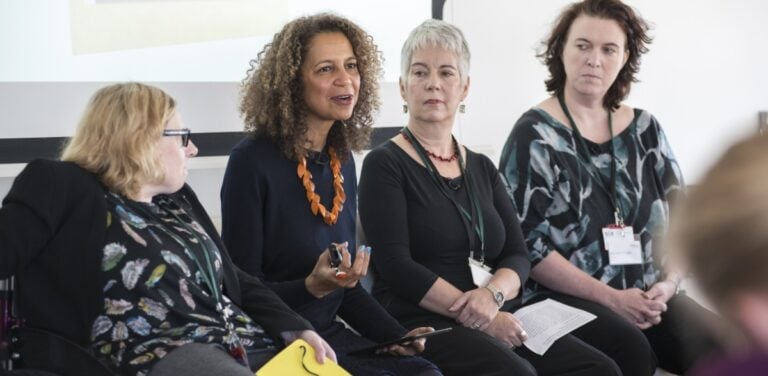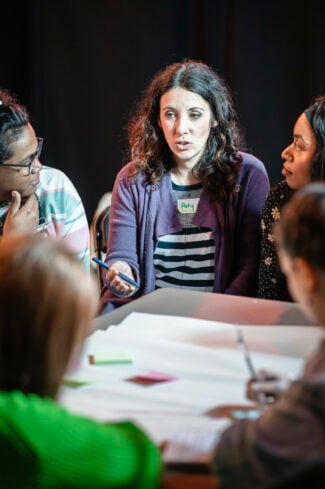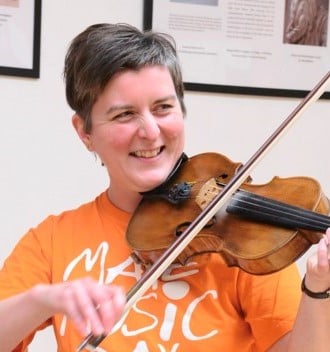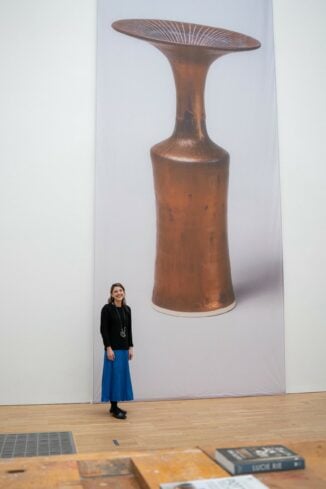Timeless Leadership
2022 Clore Fellow Cathy Mager thinks about the significance of time within leadership.
Based on the average reading speed, you will spend approximately 11 minutes and 38 seconds reading this paper, that’s if you don’t get distracted by your iPhone, pet cat or the doorbell.
Time is a word that we use constantly in our lives, in speech, thought, sign language and through the written word. How we perceive time, our use of it, and how tasks and other people impact our time, hugely motivates the decisions we make in each second of our day.
From our very first job, we are contractually obligated to be excellent timekeepers. And as we become leaders, we strive to be creators of time and space within which our organisations can thrive. But this is where imposter syndrome sets in: how can we be masters of time management when we’re barely managing to get to grips with our own work/life schedule? This was especially true for many during the height of the pandemic when planning time for anything personal or professional often felt impossible.
When we wake up in the mornings, we present ourselves with a mental list of multiple things to do before we leave the house or switch on our laptops. We then proceed to lose track of time scrolling on our phones, distracted by a news story or social media trend.
We might realise the kids have swimming today and we haven’t got their kit ready. Suddenly we’re racing against time to rummage for lost swimming trunks, goggles and towels whilst also brushing hair and finding shoes. But it’s not swimming today, as it’s Thursday, not Tuesday, so that was a waste of time.
Then we allocate a few seconds to panic about what time that first work zoom call starts, is it 9 or 9.30? and where did we put our phone so we can check the calendar, will there be enough time to prepare before the meeting? Finding our phone, the calendar alerts us to the fact that recycling needs to be sorted for collection, but we’ve run out of time to do it.
We think to ourselves – as our children are successfully deposited, albeit ten minutes late, at the school gates – I need to get better at time management. I need to find a fool proof timekeeping system that also allows space for things to go wrong, for cancellations, mood swings and illness, for success and failure, for love, fun and creativity, for rest and for play.
Time is slipping through my fingers. This time with my children is precious and fleeting. It’s high time I get more organised. We need to schedule some time out, to think more about how we are spending our time.
We divide our time into categories. Admin time, me time, family time and downtime, we even take time off in lieu if we’re lucky. We talk about making time, wasting time, borrowing time. We feel time is precious and time is money. We wish constantly we had more time, more spare time, and more quality time. We even kill time.
Everyone around us is also spending time talking about time too. So, we must squeeze in the time to accommodate other people’s need to talk about how to save time and be more time efficient. People ask to borrow you for a minute which ends up being an hour or two. You’re asked to spend ten minutes filling in an evaluation form, and it takes a whole morning. A potentially life-changing funding opportunity arises but the deadline means you must sacrifice half of your holiday time with your family. A major capital project you are overseeing is years behind schedule and your cash flow appears to have a shortfall resembling a wormhole that threatens to disrupt the space-time continuum. Suddenly time is flying out the window at breakneck speed and you’re powerless to stop it.
You may be criticised for prioritising time for the wrong things. The strain of difficult work situations can make the passing of time physically painful to experience. In moments of stress, we can feel that time is whizzing fast around us but inside our heads we are trapped in a moment of time, replaying past traumatic events. When quick decisions are being made you may ask people to slow down and think things through, but they reply: “There is no time to lose!”
As leaders, we invite our teams to come up with a solution to a problem and in a matter of minutes, an idea unfolds that changes the entire course of the organisation for the better. We can also frustrate ourselves, having allocated time to write a ground-breaking report – only to get stuck with writer’s block.
Thinking about time can be emotionally charged. We can be nostalgic about times when we felt we had all the time in the world. We desire to time travel and relive those times. We can also feel great loss around time. Feeling that we did not make the best use of time or didn’t spend more time with loved ones that have passed.
Awareness of time can vary. When standing on a Tube platform, waiting for an underground train, two minutes can feel like an eternity. And yet a train leaving from a mainline station in ten minutes feels like a mad rush, and you get on the train thinking “Phew, made it just in time.” We used to wait patiently for days for letters to arrive. Yet today, we can be left on the brink of despair in mere seconds if we lose our WIFI connection.
On a bigger, more overwhelming scale, time is running out for our world. The sands of time are slipping rapidly away. We face extinction due to climate change if war or future pandemics don’t catch up with us first. But time will outlive the end of the human world, it will go on beyond us into the unknown.
In the writing of this paper, I imagined myself making time for it. Finding time to read multiple books, carefully crafting time in my diary to set aside research time to watch videos and make notes and collect clever quotes. Yet time flew by, each minute of my day seemed overloaded with other things to do, or side lined by illness. I had yet to type out a single letter, the deadline approaching fast.
I marvelled fleetingly at the irony that I was failing to find time to write my paper about time. Time had slipped by and before I knew it my Christmas deadline had become the end of March at the soonest. How on earth do other people find time for this stuff? Eventually, I found time to write this paper, nervously eyeing the clock on the wall, whilst wrestling with a sense of guilt that I wasn’t using that time on another equally important thing I needed to do.
Every so often time stands still. When an event happens, it can be joyful or unbearably tragic, when people collectively come together, our clocks seem to synchronise, and we are all at one in the passing of that time.
Time can also feel hopeless, as we witness times of great horror and yet feel powerless to stop them from happening. We wish we could turn back time. We may ask the people we work with, if you could go back in time, what would you do differently? In evaluation, we ask people to be time travellers, revisiting past events to inform a better future.
In recent years there has been intense debate about the impact of colonialism, slavery, and ableism. Time itself was colonised. The populations of entire countries, their cultural ways of passing the time, their art and their language was forced to obey new customs, rituals, watches, bells, and whistles. We have been living for centuries in a story of time written by a very privileged minority that have left us with a skewed understanding of the present world we live in.
Many are afraid of losing the sanitised versions of history they have grown up with. There are people that feel their timeless stately homes and their quintessential cream teas are spoilt by the new presence of heritage displays that reveal the horror of the slave trade. But knowing more about our pasts and the heritage of our buildings and landscapes can only enrich the world around us.
As a deaf person, I sometimes feel I am existing in a completely different time zone to hearing people. Deaf cultural history and the story of deaf and disabled people’s resistance and struggle is very little known in wider society. I carry additional unpaid administrative responsibilities to organise access support, staff, and funding. This emotional and administrative labour often goes unrecognised. I have been openly discriminated against in front of offices full of people and live with the trauma of this.
In the past hearing colleagues have seen me as a potential threat to their time keeping. I’ve lost count of the times someone has walked away from me deciding it will be too time consuming to communicate with me.
When my interpreter fell ill one day, a colleague refused to reschedule the meeting we had planned as they said they were too busy for the next six weeks. But mysteriously found time to reschedule a meeting for another hearing colleague that same day who had to go home early. I was punished for creating inconvenience in a way my hearing colleague who had chosen to leave early for a social event, was not.
Time privilege is something I have always been extremely aware of. People who are time privileged in life are fast-tracked through education and careers. They may perceive their time to be of vital importance above all others. They never feel anyone must spare them the time as they feel entitled to it. They do not experience the same trauma, so do not need to attend as many job interviews or spend as much time recovering from oppressive behaviour. Their busy never looks like the busy of marginalised people. All this extra time on their hands, yet they’re too privileged to notice.
Deaf and disabled people are often mistaken for time disrupters. Exclusion is often rooted in the fear disability will hinder the schedules of busy people and create a burden on organisational resources. Yet Deaf and disabled people are the busiest people you will ever meet. They live in a world not designed for them. Access that is provided is often infrequent, so this limits the flexibility others are entitled to. A theatre may offer one subtitled show whilst offering three months of daily performances for hearing people. Disabled diaries seem as if half the pages have been ripped out but are still twice as full. Grief over lost experiences and missed opportunities can be a daily occurrence for deaf and disabled people.
Disabled people must bend time to counter ableism, fit in time for healthcare and access coordination yet also work and live their lives. We should be embracing the lived and learned experiences of deaf and disabled people. By creating a time and place that welcomes deaf and disabled people to spend their stretched time, we all learn how to make time for everyone.
Sometimes deaf people do disrupt time, but in a positive way. “Deaf Time” is a cultural custom for the Deaf community. The deaf-blind poet John Lee Clark explores deaf time in his moving poem, Long Goodbyes. He captures the joy and beauty of the Deaf farewell, and how deaf people have the ability to endlessly stretch out their goodbyes.
If you can travel at the speed of light, it is possible to suspend time, but of course, that’s not a mode of travel available to the vast majority. So how can leaders learn from “Crip time” and gain the ability to design spaces in which time passes more comfortably and inclusively?
We must invite the lived experiences of people who are not time-privileged to be part of every aspect of our organisations. Let their alternative histories and knowledge assimilate into everyday schedules.
Each day rather than ask the staple “How are you?”, ask your colleagues to share something they are proud of. Whilst doing this, also celebrate what you have personally achieved that day, that week, the last six months, the past year, the last decade. Remind yourself of positive things that have made a mark in your personal timeline, no matter how small. Create a space for your team or organisation to revel in these points of reflection before moving on to the day’s business. Creating time to share outside of formal evaluation processes, gifts people with a sense of the fullness of time. Time becomes more vivid and enjoyable and less of an incessant ticking clock.
When we achieve something, we’re often so focused on the delivery of it we cannot really experience the wholeness of it. It passes in a blur. We also find we don’t always do things as perfectly as we wanted or achieve all we set out to achieve. Sometimes we fail completely. It can take time to reflect and find the positive learning points within the ruins of disappointment. We can be harsh on ourselves in the short term, but as time heals us, we can look back on past mistakes with more self-compassion and understanding.
Social media influencers preach the mantra to be happy is to “live in the moment”. But our dreams betray us, taking our minds into a memory of events long past and creating visions of things we want to achieve in the future. Living in the now is also a privilege not everyone can summon. We may be in debt and treading water or feel lost in a fog of Long Covid pain long after everyone else seems to have moved on. When we find ourselves in dark times in our lives, our past and future are safe spaces in time for our minds to heal.
For every time management spreadsheet and work-life balance checklist out there, we also must accept no one can manage time because it is subject to many things beyond our control. We can spend our lives trying to be on time, or pursuing goals within a set time frame and yet still be left feeling: “I wish I had more time”. For the legacy of our leadership to stand the test of time, we must recognise time is an illusion. We cannot always be present to witness the outcome of our endeavours. The fruits of our labour can sometimes blossom where we are not expecting. We can only stay true to what we know creates a healthier and more equal world. Each positive act we make is a gift in time that flows beyond us into a new unknown but greater future.
References
- Six ways of looking at Crip Time
- Long Goodbyes poem by John Lee Clark
- The Order of Time: Carlo Rovelli
- Christine Sun Kim Clock Face
- Greta Thunberg and Vanessa Nakate quotes
Themes Inclusive Leadership Practice Practices of Self Care Qualities of Leadership
